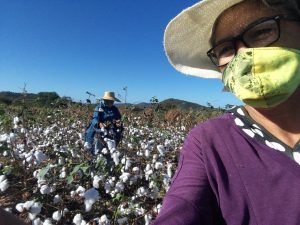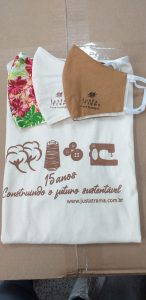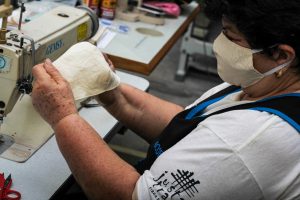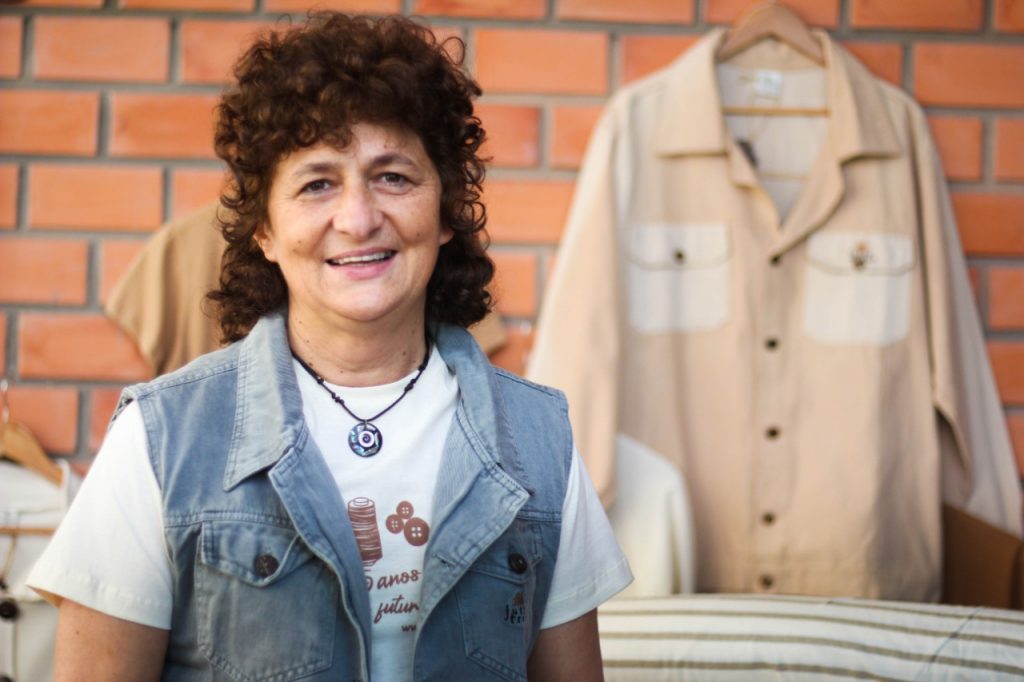São Paulo – Brazilian cooperative Justa Trama founder Nelsa Nespolo takes great pride in the organization’s work approach. Justa Trama straddles the entire cotton clothing production chain, from farm to shop. Currently in its 15 year in existence, the cooperative saw a threefold increase in revenue amid the pandemic. Nespolo (pictured above) said these difficult times have prompted many to strive for more sustainable and fair shopping.

The cooperative comprises 500 people. The product gets sold at fairs, direct to buyers online, and via partner stores. “Total sales have gone up threefold compared with last year. We had such relevant results amid this whole situation, so that means there’s still hope as the world’s behavior changes,” said Nespolo, who’s also a Justa Trama seamstress.
The cooperative spans all five regions of Brazil via a pool of other associations and cooperatives. Each organization is known as a ‘link’ and handles part of manufacturing. Adec, in Tauá, Ceará and AEFAF, in Ponta Porã, Mato Grosso do Sul grow agroecological organic cotton. Yarn-making and weaving is done by Coopertêxtil in Pará de Minas, Minas Gerais. Cooperativa Açaí in Porto Velho, Rondônia uses leftover fabric to make dolls, buttons and collages for the clothing collections. Finally, at the Justa Trama headquarters in Porto Alegre, Rio Grande do Sul, the cooperative Univens makes clothing, silk-screen, embroidery, and dyeing, and the group Inovarte creates games and toy animals.
Fair trade and organic farming

In addition to growing organic-only, the cooperative advocates a solidarity-based economy and fair trade. It pays its farmers and seamstresses 30% to 50% above market value. “We’re in the process of winning over organic shoppers, so the cooperatives are affiliated with other parties as well, and so are the seamstresses, but our link is organic cotton. We’re a big family that straddles different states in a collective construct. The results are split up equally among everyone.
Early on, the cooperative would export yarn and clothing items to Italy, but its members decided to turn to the domestic market. “We realized that the challenge was to sell within the country. That is our biggest investment.” In addition to linen, shirts, T-shirts and trousers, the cooperative also makes corporate product lines.

Justa Trama has invested in advertising on the radio and elsewhere. Nespolo has also been featured in almost 50 social media live streams. “Over these 15 years, we have seen results in how we inspire people. We sell significant amounts of fabric. People are much more aware of organics. Much of that is due to awareness of chemicals, and cotton farming accounts for 25% of all chemicals used in the world.”
She points out that cotton requires a warm, dry climate like that of Brazil’s Northeast and Midwest. The bulk of Justa Trama’s organic cotton is grown by family farmers. This year, apart from a good crop, the cooperative has harvested new members. “Out in the farm, organics keep young people interested. We’d never had so many young people [in sewing too],” said Nespolo, who has been in the cooperative sector for 24 years now.

She also said women and young people are the reason organics are on the way up. “Clothing is a very individual choice. When sales go up, that’s because people are more conscious about what they wear. I really believe in the youth right now. We often get to partner up with young people and women a lot.” Nespolo believes new workers and shoppers are drawn to sustainable production.
Justa Trama plans on eventually resuming exports. “There’s a world to be built in here, but if we get the chance, we’re open [to exporting]. Besides going to events across Latin America and Europe to let people know that collective work is possible and that it has potential, of course we’d also like to have our product reach more people abroad,” said Nespolo, who’s a frequent speaker at international events. “We miss physical events, because we’re all about the collective. We work with emotion, with being able to see one another and share ideas back and forth. We want it really badly for the pandemic to be over. We’re dying to go to the fairs and showcase these products in the flesh.”
Translated by Gabriel Pomerancblum




